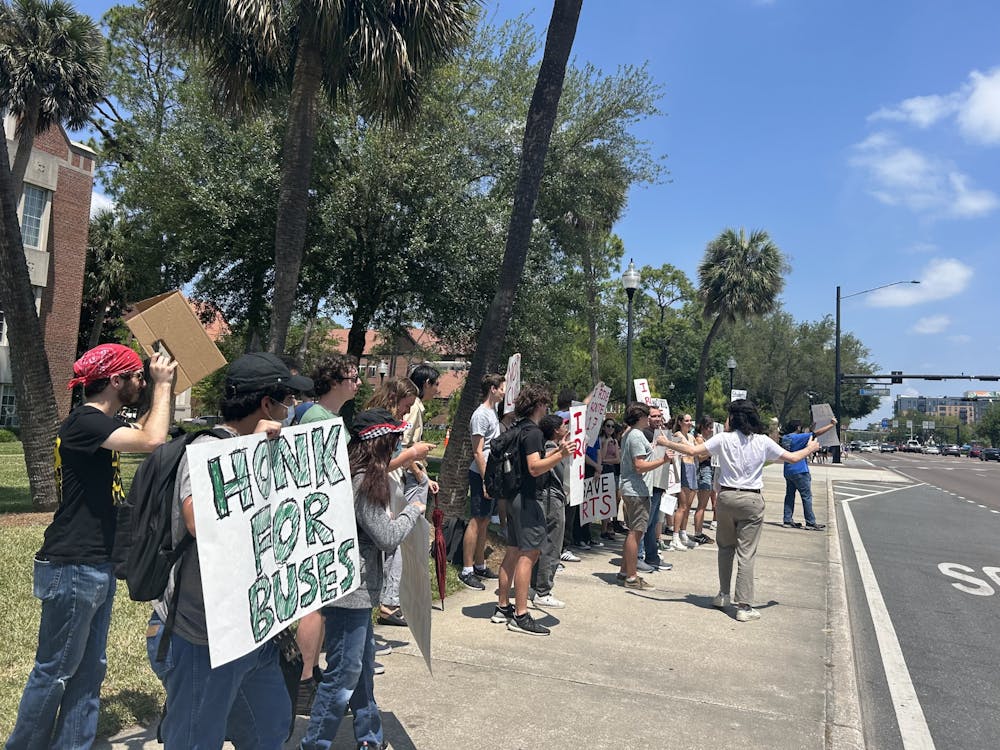UF students and faculty joined members of the Gainesville community Friday for a protest against the university’s proposed cut in funding for the Gainesville Regional Transit System, or RTS.
The protest came after the city of Gainesville announced April 9 the university proposed scaling back its prepaid bus fare program. The program, introduced in 1998, allows unlimited bus service for UF students, faculty and staff. UF funding makes up $14 million of RTS’s $28.5 million in revenue for the 2024 fiscal year, according to the city.
By cutting over half of RTS’s revenue, the university would force city leaders to fire 52 RTS employees and eliminate 11 of the bus system’s 39 routes, the city said in an April 9 press release. This would include cutting all five campus routes and six city routes.
The funding cut would go into effect July 1 after the university’s current contract with RTS expires June 30. At that point, the university proposed beginning a month-to-month agreement with Gainesville as it explores other transportation options.
UF spokesperson Steve Orlando said the city’s original news release came as a surprise and the university believed its good-faith talks were ongoing in a statement April 9.
Two days later, Dave Kratzer, UF senior vice president for construction, facilities and auxiliary, sent a letter to the mayor noting a one-way fare on an RTS bus costs $1.50 for a nonstudent passenger but $2.86 for a student passenger. He asked the city to explain the discrepancy.
Gainesville said public transit systems operate by the service hour, not by individual passengers served. Additionally, the 22-year average cost per UF passenger is $1.31 per ride, the city added in an April 22 press release.
Friday’s protest took place outside Tigert Hall, a UF building with several administrative offices. However, the group of about 50 people faced 13th Street rather than the building behind them throughout the two-hour-long event.
Some protestors held signs reading “HONK FOR BUSES” and cheered every time ongoing traffic beeped its support. Other signs emphasized the personal impact of the bus cut on the sign-wielders — like one reading “I RIDE ROUTE 118,” one of the routes proposed to be cut.
The Gainesville chapter of Amalgamated Transportation Union, a national union representing transit workers including bus drivers, mechanics and baggage handlers, helped organize the protest. The chapter’s 57-year-old president, Zefnia Durham, said he worries the funding cut would lead to more than just the 52 lost jobs outlined in the city’s press release.
Less ridership on RTS would mean less federal money, which would in turn create more job loss, Durham said. He predicts closer to 118 jobs would be lost if the university’s proposal goes through.
“A lot of people just don’t understand the gravity of it,” he said. “It would drastically change the dynamics in the city of Gainesville, as well as diminish the quality of life for the students.”
Evan Porterfield, a UF physics freshman, said he put off studying for his final calculus exam to attend the protest. He would have to make mile-long treks to class by foot if it weren’t for the bus system, he said.
“To anyone who has the power, please keep our buses. We need them,” he said.
Sofia Aviles, a 21-year-old UF sustainability and political science junior, came to the protest as president of Sunrise Movement, a climate activist organization with hubs around the country. Though she didn’t lead the protest, she was part of the conversations around organizing it, she said.
Holding the protest outside Tigert Hall, where the UF Provost and Board of Trustees offices are located, was no coincidence, Aviles said.
“We’re trying to show them that, ‘Hey, you guys are causing this protest. You guys are the reason why we’re out here,’” she said. “‘The reason why people are going to lose their jobs and there’s going to be more cars on the road.’”
Gainesville estimated that, under the proposed funding cuts, more than 9,000 additional daily car trips will be created — leading to more carbon emissions and traffic congestion and endangering the city’s and university’s respective climate action plans.
The city’s last media release on the issue, published April 22, stated commissioners remain hopeful that ongoing good-faith negotiations will lead to a full contract renewal before the June 30 deadline.
Contact Zoey Thomas at zthomas@alligator.org. Follow her on X @zoeythomas39.
Zoey Thomas is a media production junior and The Alligator's Spring 2025 data editor. She previously reported for the metro, university and enterprise desks. In her free time, you can find her reading, crocheting or arguing for the superiority of sweet potatoes over regular potatoes.






